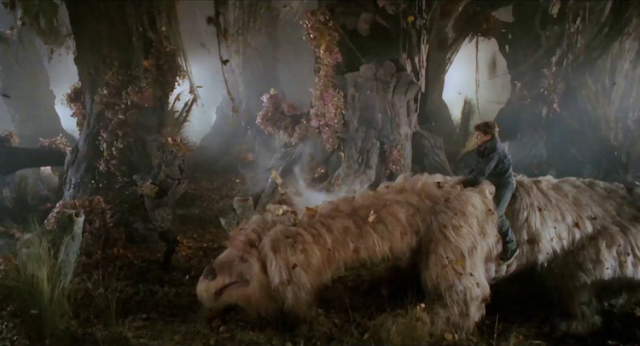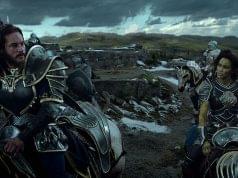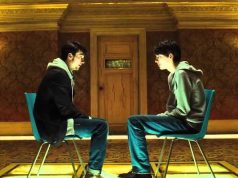
“The Neverending Story III” is a dumb kids’ movie, by which I mean it is a movie for dumb kids. Do you know any dumb kids? Then plop them down in front of “The Neverending Story III” and watch them tinkle themselves with delight!
It’s the second sequel to the 1984 semi-classic “The Neverending Story,” which was based on a 1979 German fantasy novel. (You can tell the story is German because the villain is a nebulous force called The Nothing, there are places with names like The Swamps of Sadness, and the Empress’ problem is that she doesn’t have a name. It’s a children’s story, obviously.) In the first movie, a boy named Bastian hurries into a bookstore to get away from bullies, steals a book, and eventually learns that his destiny is to forsake reality, disappear into his imagination, and spend all his days cavorting with creatures from the fantasy realm.
In “The Neverending Story II: The Next Chapter,” Bastian steals the same book and saves the same fantasy land, which apparently can’t last more than a week without needing to be saved by some loser kid from the human world. Oh, and he accidentally kills his fantasy-world friend, too. What an awesome fantasy world this is! Is this what German children daydream about?
“The Neverending Story III” picks up with Bastian (Jason James Richter) moving to a new school and immediately resuming his primary activity of being chased by bullies. He ducks into the school library for safety and discovers that Mr. Koreander (Freddie Jones) — the man who owned the bookstore that he used to steal from — is now the school librarian! And he has brought “The Neverending Story” book with him! And Bastian steals it again so he can check up on his old friends in Fantasia!
Those are the details that the director filled in. What the screenplay actually said was, “Blah blah, chased by bullies, something something, finds the book again, yada yada, can we break for lunch now?” Yes, the screenwriter actually included his request for lunch. THAT’S HOW LAZY HE WAS.
Bastian uses the magical book to escape into the world of Fantasia, which surprisingly is not currently on the verge of destruction. In fact, things are running pretty smoothly. Bastian probably barely recognizes the place. But the bullies, called the Nasties, have pursued Bastian into the library. The lead bully, Slip, is played by a unibrowed Jack Black. He says of Bastian, “When I get my hands on that slippery weasel, I’m gonna rock his world,” which is filthier than anything he said in “Tropic Thunder.”
In the library, the Nasties wonder where Bastian disappeared to, and they start randomly flipping through books, because what else would you do in a library, I guess? They happen to find “The Neverending Story,” see Bastian and themselves described in it, and surmise that if they start tearing apart the library, it will wreak havoc in Fantasia, too. That doesn’t make any sense, even by the loose standards of “making sense” normally applied in these films, but you have to go with it.
In Fantasia, sure enough, things start falling apart, but Bastian can’t get back to the real world to stop it because he doesn’t have the book with him. (But if possession of the book is required for inter-world travel, how did he get to Fantasia in the first place? And he had it in his hands in the library, so why didn’t it come with him?) But some tiny gnomes tell him he can visit the Wizard in Emerald City — I beg your pardon, the Empress in Silver City — and she can help. Her idea is to wish really hard, and THAT will transport him back to the real world.
Oh, great idea, Empress. No one ever would have thought of wishing really hard. It’s no wonder your stupid fantasy world is always falling apart. Holy crap, I hate you so much, you stupid Empress.
But where was I? Yes, the wishing. Bastian and a bunch of fantasy-world creatures link hands and wish together, and it works — but, in a completely unforeseeable turn of events, having them wish together sends them ALL to the human world, not just Bastian. This includes Falkor the dog-faced luck dragon, a baby rock-eating creature called Junior, a cranky tree, and that pair of tiny gnomes. (The gnomes get separated from the group, by the way, and find Bastian — I’m not making this up — by sneaking into a FedEx box and shipping themselves to him. No, I don’t know how they knew his address. No, I don’t know how they didn’t suffocate in the box. No, I wasn’t aware that everything FedEx shipped was delivered the very next day.)
So the trouble now, obviously, is that all these fantastical creatures are in the real world and must get back to Fantasia. Luckily, today happens to be Halloween (what a coincidence!), so they don’t look out of place as they wander the streets with Bastian looking for the Nasties, who still have the book. There is a moment, though, where Bastian has to hide Junior the rock creature from his family, calling to mind the brilliant comedic sequence in “Transformers” when Zac Efron (or whoever it was) had to hide the giant alien robots from his parents, and the giant alien robots trampled Mom’s flower garden, and the whole thing was hilarious and took up 20 minutes of the movie. Good times.
Meanwhile, there is another problem. In order to stay in contact, the Empress gave Bastian a necklace called the Auryn, which Bastian then left on his dresser when he went to school, because Bastian is an idiot. His stepsister, Nicole (Melody Kay), finds it, discovers accidentally that it grants wishes, and uses it to go on a shopping spree: She tries on clothes, declares her wish to own them, and the clerks give them to her. Because what else would a girl do with unlimited power if not obtain cute outfits? Remember, we’re talking about a GIRL here. This is what GIRLS do. Don’t forget that, young female viewers!
But rest assured, everything turns out OK in the end. Fantasia is restored to its usual state of precarious, temporary stability, and the Nasties are given their comeuppance, which includes being forced to appear in “Shallow Hal.” The moral of the story is that books are an adventure and reading is fun. The film makes a pretty good case for it, too, considering how much more enjoyable it would be to read a book than to watch this movie.
— Film.com





